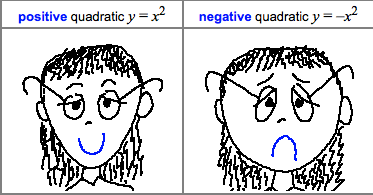
Welcome to MPM2D0
Exploring the Vertex Form of a Quadratic Relationship.
In the following equation: y= ax^2
We are going to determine the effect of a in the equation.
Examples: y= 3x^2, y= 0.5x^2, and y= -0.25x^2
When graphing the following equations. Many comparisons are established:
Firstly, when graphing the equations y=3x^2 and y= 0.5x^2. The effect of 3 as the a value in y=ax^2, the parabola is very skinny and close to the y- intercept in other terms it is vertically stretched, while the effect of 0.5 as the a value, the parabola is bigger and away from y axis meaning it is being vertically compressed.
However, when graphing y= -0.25x^2, the parabola is vertically compressed, but since there is a negative in from the a value the parabola is reflected on the x axis and now opens down.
Note: The effect of a in the y=ax^2 is that the value of a determine if the parabola is vertically stretched or compressed and the sign in front of the a value determines whether the parabola opens up or down.
Now we explore effect of k in y= x^2 + k
We learn that when you if the k value is positive, that is the amount of units the vertex moves up and if the k value is a negative, the vertex moves down certain units.
Lastly we are going to explore the effect of h in y= (x-h)^2
The effect of h value on the vertex and parabola itself is that it determines if the vertex moves left or right. If the h value is negative the vertex moves to the left and if the h value is positive the vertex moves to the right.
Recall:
example: y= 2 (x-3)^2 +5
The number 2 means that the parabola is stretched by the factor of 2.
The number -3 means that the vertex moves 3 units to the left.
The number 5 means that the vertex moves 5 units up.
-
The a value determines if the vertex is being compressed or stretched.
-
The k value determines whether the vertex moves up or down.
-
The h value determines whether the vertex moves right or left.
Transformations of a Parabola.
A parabola takes many transformations. However, the vertex form of a parabola is y = a (x-h)^2 +k
The basic parabola has the formula of y= x^2
As discussed before the value of "a" determines the orientation and the shape of the parabola.
To determine the orientation of the parabola:
-
If the a value is greater than 0, the parabola must open up. ( like a smile)
-
If the a value is less than 0 , the parabola must open down. ( like a frown)
To determine the shape of the parabola:
-
If -1 < a < 1, the parabola is vertically compressed.
-
if a > 1 or a < -1, the parabola is vertically stretched.
Example; 2x^2
-opens up
- vertically stretched by a factor of 2.
Example 2) -9x^2
- opens down.
- stretched by a factor of 9.
Example 3) - 0.25x^2
-opens down.
- vertically compressed by a factor of 0.25.
The value of "k" determine the vertical position of the parabola.
-
If k > 0, the vertex moves up by the k units.
-
If k < 0, the vertex moves down by the k units.
Example; y= x^2+3
- 3 units up.
Example 2) y= x^2 -6
-6 units down.
The value of h determine the horizontal position of the parabola.
-
If h > 0, the vertex moves to the right h units.
-
If h < 0, the vertex moves to the left h units.
